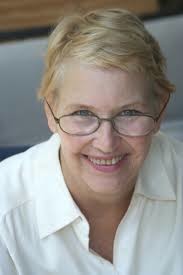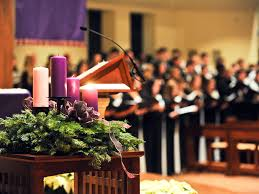Although I was raised in the most non-liturgical version of Christianity imaginable, I love liturgy. When I was introduced to the annual liturgical cycle when I encountered the Episcopal church in my twenties, I found that I particularly resonated with Advent, the four weeks between Thanksgiving and Christmas that kicks off the liturgical year. Advent is the season of hope and expectation, which this year is particularly welcome. Because for many of us, hope is a particularly scarce commodity these days.
Cyprian Consiglio, the Benedictine monk, theologian, hermitage prior and musician who ran the retreat I attended in Minnesota a couple of years ago, defines “liturgy” as “ideology in action.” Annie Dillard defines it as a collection of words and phrases that human beings over the centuries have been able to address to God without getting killed (she also suggests that we should wear crash helmets to church).
 I like both of these definitions. I have a deep resonance with liturgy, especially liturgy expressed in music, something surprising given that there was none in my Baptist world growing up. Although “ideology” is usually something I accuse people I disagree with of embracing, Cyprian’s definition reminds me that at its core, ideology is simply the collection of beliefs, stories, ideas and commitments, some conscious and some unconscious, that guides a person’s actions and frames a person’s life. We are all ideologues. Liturgical frameworks provide a container that shapes this collection with reference to what is greater than us. Annie’s definition is a reminder that the very attempt to say or do anything with content and meaning referring to what is greater than us is at best misguided, at worst ridiculous.
I like both of these definitions. I have a deep resonance with liturgy, especially liturgy expressed in music, something surprising given that there was none in my Baptist world growing up. Although “ideology” is usually something I accuse people I disagree with of embracing, Cyprian’s definition reminds me that at its core, ideology is simply the collection of beliefs, stories, ideas and commitments, some conscious and some unconscious, that guides a person’s actions and frames a person’s life. We are all ideologues. Liturgical frameworks provide a container that shapes this collection with reference to what is greater than us. Annie’s definition is a reminder that the very attempt to say or do anything with content and meaning referring to what is greater than us is at best misguided, at worst ridiculous.
 Of the many varieties of liturgical celebration I have encountered over the past several years, including a number of them at St. John’s Abbey in Minnesota (the Benedictines know how to do liturgy better than anyone), the most striking is the Good Friday morning prayer service I have experienced twice with the monks at the Abbey. On Good Friday afternoon there is the large, austere three-hour service permeated primarily with silence and capped by kissing the cross that certain sorts of Christians are fond of (I’m not one of them). But at 7:00 in the morning, the Good Friday morning prayer service sets the tone for the day as a solitary monk chants the entire book of Lamentations from the Jewish scriptures.
Of the many varieties of liturgical celebration I have encountered over the past several years, including a number of them at St. John’s Abbey in Minnesota (the Benedictines know how to do liturgy better than anyone), the most striking is the Good Friday morning prayer service I have experienced twice with the monks at the Abbey. On Good Friday afternoon there is the large, austere three-hour service permeated primarily with silence and capped by kissing the cross that certain sorts of Christians are fond of (I’m not one of them). But at 7:00 in the morning, the Good Friday morning prayer service sets the tone for the day as a solitary monk chants the entire book of Lamentations from the Jewish scriptures.  Not familiar with that book? That’s probably because it’s the most depressing book in the Bible—perhaps anywhere. Lamentations is a litany of five poetic dirges over the destruction of Jerusalem. Traditionally attributed to the prophet Jeremiah, the tone of the poems is bleak: God does not speak, the degree of suffering is presented as undeserved, and expectations of future redemption are minimal. In Psalm 129 the Psalmist writes “Plowmen have plowed my back and made their furrows long”—Lamentations is page after page of that sentiment.
Not familiar with that book? That’s probably because it’s the most depressing book in the Bible—perhaps anywhere. Lamentations is a litany of five poetic dirges over the destruction of Jerusalem. Traditionally attributed to the prophet Jeremiah, the tone of the poems is bleak: God does not speak, the degree of suffering is presented as undeserved, and expectations of future redemption are minimal. In Psalm 129 the Psalmist writes “Plowmen have plowed my back and made their furrows long”—Lamentations is page after page of that sentiment.
Exactly two years ago I found myself sitting toward the back of Providence College’s main chapel waiting for the beginning of a service in memory of our beloved colleague and friend Siobhan who died far too soon in an automobile accident the day before Thanksgiving. As I sat with the several hundred persons who closed offices and cancelled classes in the middle of the day to honor  Siobhan and celebrate her life, I noticed in the program that the Old Testament reading was from Lamentations. “That’s appropriate,” I thought. “At least there’s nothing in Lamentations that will tell us we should not feel the devastating loss and sadness that we share right now.” But I had forgotten that just about half way through the poems, Jeremiah comes up briefly for air.
Siobhan and celebrate her life, I noticed in the program that the Old Testament reading was from Lamentations. “That’s appropriate,” I thought. “At least there’s nothing in Lamentations that will tell us we should not feel the devastating loss and sadness that we share right now.” But I had forgotten that just about half way through the poems, Jeremiah comes up briefly for air.
I will call this to mind, as my reason to hope:
The favors of the Lord are not exhausted, his mercies are not spent;
They are renewed each morning, so great is his faithfulness.
My portion is the Lord, therefore will I hope in him.
Good is the Lord to one who waits for him, to the soul that seeks him;
It is good to hope in silence for the saving help of the Lord.
I t seem like only a short time ago that a dynamic, fresh new face burst onto the American political scene promising “Hope and Change”; not long afterwards Sarah Palin, not particularly enamored of this new guy, snarkily asked “How’s that hopey changey thing working out for ya?” Politics aside, it’s a good question. The Apostle Paul famously wrote “Now abide faith, hope and love—but the greatest of these is love.” The editor of First Corinthians took out something else Paul wrote: “But sometimes the toughest of these is hope.”
t seem like only a short time ago that a dynamic, fresh new face burst onto the American political scene promising “Hope and Change”; not long afterwards Sarah Palin, not particularly enamored of this new guy, snarkily asked “How’s that hopey changey thing working out for ya?” Politics aside, it’s a good question. The Apostle Paul famously wrote “Now abide faith, hope and love—but the greatest of these is love.” The editor of First Corinthians took out something else Paul wrote: “But sometimes the toughest of these is hope.”
Advent is the liturgical season of hope—my favorite of all the liturgical seasons because it means that the semester is almost over, I like purple, enjoy the Advent carols that only come around once a year, appreciate the opportunity to do something other than slog through the interminable Ordinary Time that has been going on since May, and because I am by nature a very hopeful person. But it has been a bit of a tough sell for many of us lately, with seemingly daily evidence that the world is a mess, no one has the capacity or wants to do anything about it, our country has elected a spectacularly unqualified person to be our next President, sprinkled with regular and tragic reminders that human life is fleeting and even the best can be taken away in a moment. “ The world really sucks,” my lovely wife commented as we listened to NPR the other morning on the way downtown to the bus station so she could catch a ride to NYC for a weekend with her sister whose husband just died. And it does suck. But if we are willing to poke our heads even momentarily up from the shit, Lamentations tells us that hope is always appropriate—and is a choice.
The world really sucks,” my lovely wife commented as we listened to NPR the other morning on the way downtown to the bus station so she could catch a ride to NYC for a weekend with her sister whose husband just died. And it does suck. But if we are willing to poke our heads even momentarily up from the shit, Lamentations tells us that hope is always appropriate—and is a choice.
Providence College’s annual Advent Lessons and Carols Service, an annual early December event, always opens with a beautiful hymn:
O come, divine Messiah!
The world in silence waits the day
When hope shall sing its triumph,
And sadness flee away.
Dear Savior haste;
Come, come to earth,
Dispel the night and show your face,
And bid us hail the dawn of grace.
Who doesn’t want sadness to flee away? Who doesn’t want to see the dawn of grace that will drive away the night? But when the sadness is palpable, when the night is especially dark, what hope can a song offer? More importantly, in the midst of Advent, do we have any reason to believe that what we hope for—a divine presence in the midst of human sadness and darkness—is anything more than a fairy tale we repeat regularly in order to convince ourselves that there is a glimmer of meaning in a horribly dark world?
According to Lamentations, we have reason to hope if we choose to have it. And the reason to hope will not be found in external events, which will be as they will be. Hope finds its home in waiting, in silence, in emptiness, and in the conviction that there is more going on than meets the eye. There are as many ways to nurture the space of quietness and silence within as there are people containing that space. Our task is to be ready, to prepare a space for hope and promise to be nurtured, even when every external indicator is that there is no reason to hope. As Lao Tzu wrote,
We shape clay into a pot,
but it is the emptiness inside that holds whatever we want.
We hammer wood for a house,
but it is the inner space that makes it livable.
I was taught as a child that I should find a place for the Christ child in my heart. I don’t exactly use that language any more, but I know what it means.
You come in peace and meekness,
And lowly will your cradle be;
All clothed in human weakness
Shall we your Godhead see.












